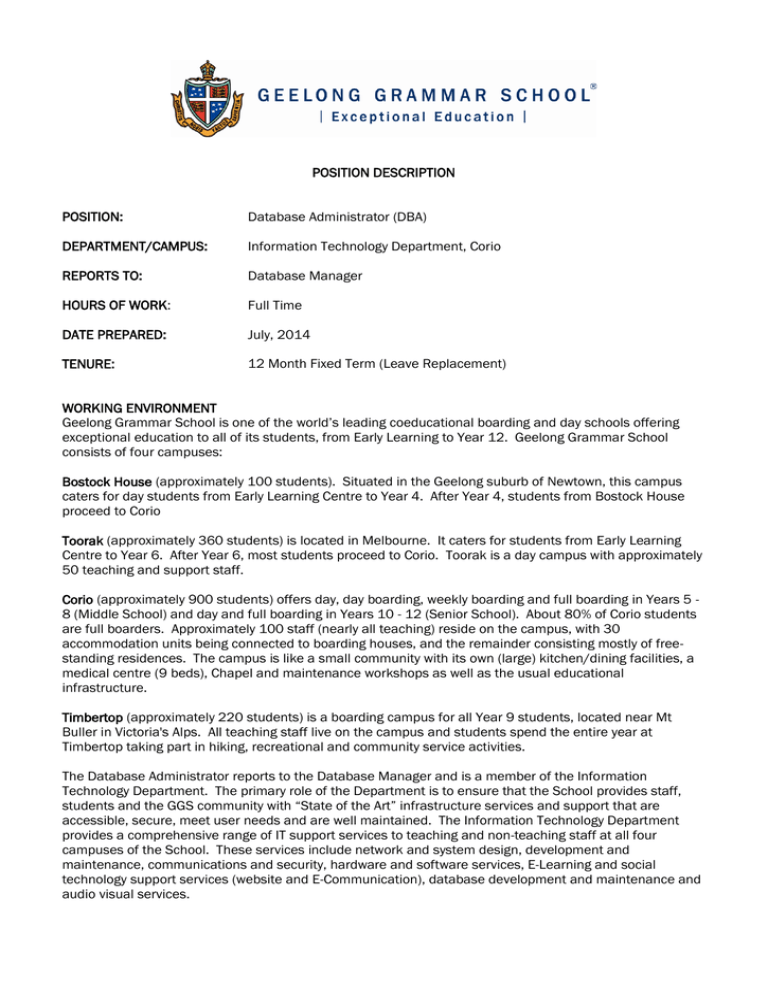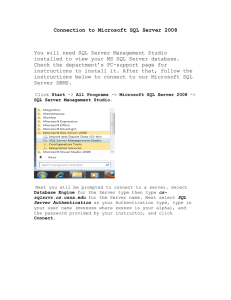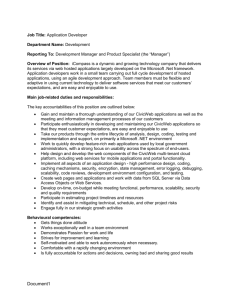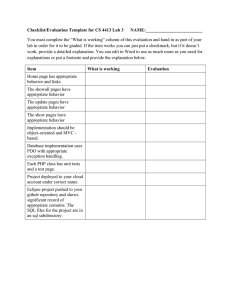Database Administrator (DBA)
advertisement

POSITION DESCRIPTION POSITION: Database Administrator (DBA) DEPARTMENT/CAMPUS: Information Technology Department, Corio REPORTS TO: Database Manager HOURS OF WORK: Full Time DATE PREPARED: July, 2014 TENURE: 12 Month Fixed Term (Leave Replacement) WORKING ENVIRONMENT Geelong Grammar School is one of the world’s leading coeducational boarding and day schools offering exceptional education to all of its students, from Early Learning to Year 12. Geelong Grammar School consists of four campuses: Bostock House (approximately 100 students). Situated in the Geelong suburb of Newtown, this campus caters for day students from Early Learning Centre to Year 4. After Year 4, students from Bostock House proceed to Corio Toorak (approximately 360 students) is located in Melbourne. It caters for students from Early Learning Centre to Year 6. After Year 6, most students proceed to Corio. Toorak is a day campus with approximately 50 teaching and support staff. Corio (approximately 900 students) offers day, day boarding, weekly boarding and full boarding in Years 5 8 (Middle School) and day and full boarding in Years 10 - 12 (Senior School). About 80% of Corio students are full boarders. Approximately 100 staff (nearly all teaching) reside on the campus, with 30 accommodation units being connected to boarding houses, and the remainder consisting mostly of freestanding residences. The campus is like a small community with its own (large) kitchen/dining facilities, a medical centre (9 beds), Chapel and maintenance workshops as well as the usual educational infrastructure. Timbertop (approximately 220 students) is a boarding campus for all Year 9 students, located near Mt Buller in Victoria's Alps. All teaching staff live on the campus and students spend the entire year at Timbertop taking part in hiking, recreational and community service activities. The Database Administrator reports to the Database Manager and is a member of the Information Technology Department. The primary role of the Department is to ensure that the School provides staff, students and the GGS community with “State of the Art” infrastructure services and support that are accessible, secure, meet user needs and are well maintained. The Information Technology Department provides a comprehensive range of IT support services to teaching and non-teaching staff at all four campuses of the School. These services include network and system design, development and maintenance, communications and security, hardware and software services, E-Learning and social technology support services (website and E-Communication), database development and maintenance and audio visual services. POSITION OBJECTIVES: The main objectives of the Database Administrator are to advise and consult closely with the Director of IT, Data Technologies Manager, Database Manager within the following areas: to upgrade the SQL 2008 R2 servers and manage continued performance optimisation. to assist in the planning and database development required with the phasing out of Microsoft Access database applications. to complete well annotated and documented database development and procedures, thorough testing and minimal impact implementation in alignment with our change management practices to perform clean-up of redundant SQL objects, which will include, but not limited to tables, views, stored procedures and functions. to ensure information availability, security and integrity. to perform system/application upgrades of third party software. to ensure staff are supported at all stages of upgrades and development. to assist with data extraction and manipulation as required. advise and consult with Computing Directions Australia (CDA) in the development of new functionality within the Synergetic system when directed KEY RESPONSIBILITIES: The Database Administrator will be responsible for providing the following services and functions: 1. In conjunction with Network Manager and Computing Directions Australia (CDA), upgrade existing SQL servers to the latest version compatible with the school’s administration software (Synergetic). 2. Working with the Database Manager, plan and implement the database architecture and processes required to convert and migrate Microsoft Access databases to SQL databases. This will include, but not limited to, data extraction and manipulation. 3. Coordinate and consult with key internal staff and, at times third party companies including Computing Directions Australia (CDA), in developing the specifications for modifications, enhancements and upgrades to database driven applications and servers, while ensuring any outage periods are well communicated and risks reduced. 4. Monitor database performance and in consultation with the Database Manager, implement performance optimisation as required, including but not limited to query optimisation and indexing. 5. Ensure proper system documentation and user procedures to guide other technical staff and support the training of users in relation to upgraded and migrated applications. 6. Design quality assurance checks to ensure user/data integrity is guaranteed. 7. Ensure and maintain the highest levels of control over system access and security. 8. Maintain housekeeping routines to maximise performance. 9. Assist in the monitoring and processing of the user support mailbox and other departmental administrative tasks. 10. Any other duties as directed. ORGANISATIONAL RELATIONSHIPS The Database Administrator reports to the Database Manager and has regular contact with the following positions and Departments within the School: Internal liaisons Director IT Data Technologies Manager Network Manager External liaisons Computing Directions Australia (CDA) KEY SELECTION CRITERIA The position of Database Administrator requires the following key skills and experience; 1. Knowledge and experience in the following systems a) Microsoft SQL Server 2008 (minimum) b) Microsoft SQL Server Management Studio c) Microsoft Access 97 (including ODBC connections) d) Windows 7 & Microsoft Office Suite (2013) 2. Proven experience as a Database Administrator/Developer in an application development environment 3. Proven experience in the implementation/upgrading of Microsoft SQL Server and continual management/maintenance of servers and databases within a Microsoft SQL environment. 4. Proven experience in optimising database performance using techniques such as query optimisation and indexing. 5. Ability to create database catalogues and tables and write various well designed SQL queries. 6. Ability to develop and maintain SQL stored procedures, functions and triggers to facilitate data extraction, manipulation and the migration of data between various applications. 7. Ability to create and manipulate Maintenance Plans and perform database backups and restorations as required. 8. Well-developed analytical and problem solving skills demonstrating a careful and methodical approach to detailed technical work 9. Ability to design, develop and document system changes based on User’s and business strategic needs. 10. Ability to test system changes and diagnose issues, while minimising user impact and communicating updates as required to the Database Manager. 11. Good communication and people skills plus the ability to liaise and work with people at all levels within the organisation. 12. A proven ability to work both independently and in partnership with other staff as part of a team. 13. Well-developed administrative and organisational skills. 14. Ability to plan daily workloads and prioritise schedules and meet deadlines. 15. Advantage, but not essential, if there is a basic understanding of the follow items: a) Crystal Reports b) Synergetic Management System by Computing Directions Australia (CDA) c) SQL Diagnostic Manager by Idera d) VM infrastructure e) ASP.NET (C#) f) Web application and security techniques POSITIVE EDUCATION All new members of staff will be required to undertake a three day Positive Psychology training conference usually held in January each year. QUALIFICATIONS AND EXPERIENCE The position of Database Administrator requires the following qualifications and experience: Mandatory Relevant tertiary or TAFE Computer Science/Information Technology course Relevant SQL 2008 or later version administration, development and upgrading WORKING WITH CHILDREN CHECK All employees of Geelong Grammar School must undertake a Working with Children Check (Employment) prior to appointment. Attachment 1: The Geelong Grammar School Purpose Document Geelong Grammar School Purpose Document


